29.2.3.4.5 (29 > 62)
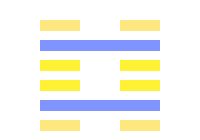
29.2.3.4.5 (29 > 62) - THE KHAN HEXAGRAM.
- 2. The second line, undivided, shows its subject in all the peril of the defile. He will, however, get a little (of the deliverance) that he seeks.
- 3. The third line, divided, shows its subject, whether he comes or goes ( = descends or ascends), confronted by a defile. All is peril to him and unrest. (His endeavours) will lead him into the cavern of the pit. There should be no action (in such a case).
- 4. The fourth line, divided, shows its subject (at a feast), with (simply) a bottle of spirits, and a subsidiary basket of rice, while (the cups and bowls) are (only) of earthenware. He introduces his important lessons (as his ruler's) intelligence admits. There will in the end be no error.
- 5. The fifth line, undivided, shows the water of the defile not yet full, (so that it might flow away) ; but order will (soon) be brought about. There will be no error.
29.2.3.4.5 (29 > 62) - Visiting one last time
One sees one's friends again to say farewell.
Bing DeepL Google Yandex29.2.3.4.5 (29 > 62) - Visiting one last time
One sees one's friends again to say farewell.
Bing DeepL Google Yandex29.2.3.4.5 (29 > 62) - K’ân, l’abîme
K’ān : danger, précipice, caverne. — Tsa k’ān : courir de grands risques ; s’exposer au danger pour un autre.
-
2. Dans les écueils périlleux, si on sait modérer ses sentiments, on pourra en sortir heureusement.
Si on garde la modération. - 3. Si en tout et partout on ne rencontre que danger, que les périls, les sujets de crainte s’accumulent, alors dans un tel danger, il n’y a plus d’expédient qui puisse servir. — Il n’y aura plus de secours possible.
- 4. Si l’on offre des sacrifices avec simplicité (sans ostentation), avec un vase de spiritueux et une corbeille de grains, tandis que les assistants n’ont que des vases de terre, si par cette modération on se forme à la vertu, alors qu’on aurait d’abord des difficultés et des écueils, on deviendra irréprochable. (Moyen d’éviter les dangers.)
- 5. Mais si le danger n’est pas inéluctable, si une caverne où l’on se trouve n’est point pleine d’eau et qu’on puisse encore aplanir le terrain, on en sortira sans faute. — Il n’arrivera pas malheur.
29.2.3.4.5 (29 > 62) - Rendre visite une dernière fois
On revoit ses amis pour leur dire adieu.
Bing DeepL Google Yandex29.2.3.4.5 (29 > 62) - Mélység
- 2. Ha valaki túl nagy nehézségekkel kerül szembe, rá kell hagynia olyanokra akik tudják kezelni azokat.
- 3. Látják amit elrontott így odébbáll.
- 4. Ha valaki eszközök híján van, meg kell elégednie egyszerű dolgokkal.
- 5. Mielőtt visszatérne hogy segítsen másokon, szünetet kell tartania és fel kell készülnie hogy válaszoljon a közelállóknak.
The trigrams
The trigrams are combinations of three yin and yang lines. The three bottom lines of the hexagram form the lower trigram and represent the inner situation. The three top lines form the upper trigram and represent the outer situation.
Upper trigram: The water The thunder


Lower trigram: The water The mountain


The formation: 29
What is already there
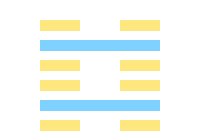
29 - THE KHAN HEXAGRAM.
Khan, here repeated, shows the possession of sincerity, through which the mind is penetrating. Action (in accordance with this) will be of high value.
Bing DeepL Google Yandex29 - K’ân, l’abîme
K’ān : danger, précipice, caverne. — Tsa k’ān : courir de grands risques ; s’exposer au danger pour un autre.
Texte
La droiture, le coeur fidèle et attaché, réussit ; ses actes ont de l’éclat s’il persévère malgré le danger.
Symbolisme
L’eau s’étendant au loin (deux fois eau) forme le Koua. Le sage, d’une vertu constante, agit vertueusement et s’applique à l’enseignement. Il répand ses biens comme l’eau.
Commentaire
Tsa k’ān est un danger grave. L’eau débordant, mais ne remplissant pas tout (que figure le Koua), représente les dangers courus sans qu’on perde sa fidélité constante. Le coeur attaché réussit ; quand la force garde le milieu, tout ce qu’on fait est bon et méritoire. Le ciel a ses dangers qu’on ne peut surmonter. La terre a les siens dans les montagnes, les fleuves et les ravins. Les rois et princes arrangent les choses dangereuses de manière à sauvegarder leurs États. Le moment du danger est bien grave.
29 - La profondeur
Quand les problèmes sont trop difficiles, on essaie de les contourner.
Bing DeepL Google Yandex
29.2 (29 > 8) - THE KHAN HEXAGRAM.
The second line, undivided, shows its subject in all the peril of the defile. He will, however, get a little (of the deliverance) that he seeks.
Bing DeepL Google Yandex29.2 (29 > 8) - Passing the buck
When one encounters difficulties that are too great, one leaves them to those who know how to handle them.
Bing DeepL Google Yandex29.2 (29 > 8) - Passing the buck
When one encounters difficulties that are too great, one leaves them to those who know how to handle them.
Bing DeepL Google Yandex29.2 (29 > 8) - K’ân, l’abîme
K’ān : danger, précipice, caverne. — Tsa k’ān : courir de grands risques ; s’exposer au danger pour un autre.
Dans les écueils périlleux, si on sait modérer ses sentiments, on pourra en sortir heureusement.
Si on garde la modération.
29.2 (29 > 8) - S'en remettre aux autres
Quand on rencontre des difficultés trop grandes, on laisse faire ceux qui savent les résoudre.
Bing DeepL Google Yandex29.2 (29 > 8) - Mélység
Ha valaki túl nagy nehézségekkel kerül szembe, rá kell hagynia olyanokra akik tudják kezelni azokat.
Bing DeepL Google Yandex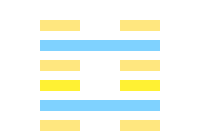
29.3 (29 > 48) - THE KHAN HEXAGRAM.
The third line, divided, shows its subject, whether he comes or goes ( = descends or ascends), confronted by a defile. All is peril to him and unrest. (His endeavours) will lead him into the cavern of the pit. There should be no action (in such a case).
Bing DeepL Google Yandex29.3 (29 > 48) - Leaving the field
Others notice what one has wasted, thus one leaves.
Bing DeepL Google Yandex29.3 (29 > 48) - Leaving the field
Others notice what one has wasted, thus one leaves.
Bing DeepL Google Yandex29.3 (29 > 48) - K’ân, l’abîme
K’ān : danger, précipice, caverne. — Tsa k’ān : courir de grands risques ; s’exposer au danger pour un autre.
Si en tout et partout on ne rencontre que danger, que les périls, les sujets de crainte s’accumulent, alors dans un tel danger, il n’y a plus d’expédient qui puisse servir. — Il n’y aura plus de secours possible.
Bing DeepL Google Yandex29.3 (29 > 48) - Abandonner le terrain
Les autres voient ce que l'on a gâché, alors on s'en va.
Bing DeepL Google Yandex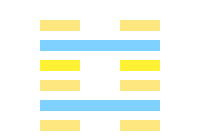
29.4 (29 > 47) - THE KHAN HEXAGRAM.
The fourth line, divided, shows its subject (at a feast), with (simply) a bottle of spirits, and a subsidiary basket of rice, while (the cups and bowls) are (only) of earthenware. He introduces his important lessons (as his ruler's) intelligence admits. There will in the end be no error.
Bing DeepL Google Yandex29.4 (29 > 47) - Living sparsely
When one has little means, one is content with simple things.
Bing DeepL Google Yandex29.4 (29 > 47) - Living sparsely
When one has little means, one is content with simple things.
Bing DeepL Google Yandex29.4 (29 > 47) - K’ân, l’abîme
K’ān : danger, précipice, caverne. — Tsa k’ān : courir de grands risques ; s’exposer au danger pour un autre.
Si l’on offre des sacrifices avec simplicité (sans ostentation), avec un vase de spiritueux et une corbeille de grains, tandis que les assistants n’ont que des vases de terre, si par cette modération on se forme à la vertu, alors qu’on aurait d’abord des difficultés et des écueils, on deviendra irréprochable. (Moyen d’éviter les dangers.)
Bing DeepL Google Yandex29.4 (29 > 47) - Vivre chichement
Quand on a peu de moyens, on se contente de choses simples.
Bing DeepL Google Yandex29.4 (29 > 47) - Mélység
Ha valaki eszközök híján van, meg kell elégednie egyszerű dolgokkal.
Bing DeepL Google Yandex
29.5 (29 > 7) - THE KHAN HEXAGRAM.
The fifth line, undivided, shows the water of the defile not yet full, (so that it might flow away) ; but order will (soon) be brought about. There will be no error.
Bing DeepL Google Yandex29.5 (29 > 7) - Going on vacation
Before returning to help others, one must take a break and prepare oneself to answer to one's relatives.
Bing DeepL Google Yandex29.5 (29 > 7) - Going on vacation
Before returning to help others, one must take a break and prepare oneself to answer to one's relatives.
Bing DeepL Google Yandex29.5 (29 > 7) - K’ân, l’abîme
K’ān : danger, précipice, caverne. — Tsa k’ān : courir de grands risques ; s’exposer au danger pour un autre.
Mais si le danger n’est pas inéluctable, si une caverne où l’on se trouve n’est point pleine d’eau et qu’on puisse encore aplanir le terrain, on en sortira sans faute. — Il n’arrivera pas malheur.
Bing DeepL Google Yandex29.5 (29 > 7) - Partir en congés
Avant de retourner aider les autres, on doit faire une pause et se préparer à répondre à ses proches.
Bing DeepL Google Yandex29.5 (29 > 7) - Mélység
Mielőtt visszatérne hogy segítsen másokon, szünetet kell tartania és fel kell készülnie hogy válaszoljon a közelállóknak.
Bing DeepL Google YandexIn the making: 62
What is poised to happen

62 - THE HSIÂO KWO HEXAGRAM.
Hsiâo Kwo indicates that (in the circumstances which it implies) there will be progress and attainment. But it will be advantageous to be firm and correct. (What the name denotes) may be done in small affairs, but not in great affairs. (It is like) the notes that come down from a bird on the wing ;---to descend is better than to ascend. There will (in this way) be great good fortune.
Bing DeepL Google Yandex62 - Siao kouoh, la prépondérance du petit
Siaō kouoh : (petit, peu, ou des petits), avancement, manquement, défaut, avancer, dépasser, passer à côté, transgresser.
Siao kouo « petite supériorité (ou des petits) ». Dans tous leurs stades de développement, les petits sont capables de petites choses et pas de grandes. C’est comme le son laissé par le passage d’un oiseau volant, il ne peut pas grandir (s’élever), mais uniquement diminuer (ou baisser) 3.
3 Suite et opposition au n° 28
Texte
Petit avancement. En toute la série de ses actes, le petit peut faire de petites choses, mais point de grandes. C’est comme le bruit fait par le passage d’un oiseau, il ne peut pas grandir, mais seulement diminuer, baisser (Ier sens).
Symbolisme
Cet hexagramme représente le tonnerre au-dessus d’une montagne. Kouoh est manquement. — Le sage, dans ses actions ordinaires, manque par respect insuffisant. — En cas de deuil, on manque quant aux vêtements ; dans les dépenses journalières, on manque par rapport à l’économie.
Commentaire
Si en avançant le petit agit selon les circonstances et qu’il garde le juste milieu, les petites affaires qu’il fera réussiront. Le fort qui perd sa dignité et ne garde pas le milieu ne peut plus, par cela même, rien faire de grand. Il est représenté ici sous la figure de l’oiseau volant ; le bruit de son vol ne peut s’élever, mais uniquement diminuer. — Le grand résiste, le petit cède.
The nuclear hexagram: 27.1.2.3.4.5.6 (27 > 28)
The nuclear hexagram is the association of the two inner trigrams (lines 2,3,4 and 3,4,5). It represents the root, or the origin of the situation.
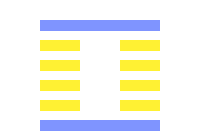
27.1.2.3.4.5.6 (27 > 28) - THE Î HEXAGRAM.
- 1. The first line, undivided, (seems to be thus addressed), ‘You leave your efficacious tortoise, and look at me till your lower jaw hangs down.’ There will be evil.
- 2. The second line, divided, shows one looking downwards for nourishment, which is contrary to what is proper ; or seeking it from the height (above), advance towards which will lead to evil.
- 3. The third line, divided, shows one acting contrary to the method of nourishing. However firm he may be, there will be evil. For ten years let him not take any action, (for) it will not be in any way advantageous.
- 4. The fourth line, divided, shows one looking downwards for (the power to) nourish. There will be good fortune. Looking with a tiger's downward unwavering glare, and with his desire that impels him to spring after spring, he will fall into no error.
- 5. The fifth line, divided, shows one acting contrary to what is regular and proper ; but if he abide in firmness, there will be good fortune. He should not, (however, try to) cross the great stream.
- 6. The sixth line, undivided, shows him from whom comes the nourishing. His position is perilous, but there will be good fortune. It will be advantageous to cross the great stream.
27.1.2.3.4.5.6 (27 > 28) - Saying goodbye
One agrees on an appointment to say goodbye to those whom one is leaving.
Bing DeepL Google Yandex27.1.2.3.4.5.6 (27 > 28) - Saying goodbye
One agrees on an appointment to say goodbye to those whom one is leaving.
Bing DeepL Google Yandex27.1.2.3.4.5.6 (27 > 28) - I, l’alimentation
Ī : 1. Entretenir, soutenir ; 2. Menton, côté de la bouche ; 3. Profond.
-
1. Laissant là votre tortue merveilleuse (l’une des quatre espèces d’êtres surnaturels), vous me regardez remuant le menton (2e sens) (pour manger). — (Expression consacrée, signifiant négliger les biens supérieurs pour s’attacher aux biens matériels.) C’est mal. — La tortue céleste qui indique l’avenir ne se peut manger ; aussi on la néglige.
Note. Animaux célestes indiquant par leurs apparitions les volontés du ciel et de l’avenir. Les autres sont la licorne, le dragon et le phénix. - 2. Baisser le menton, c’est renverser les lois morales. Le lever vers les hauteurs, c’est aller au mal, au malheur. (Ces deux expressions désignent ceux qui font les parasites près des petits et près des grands — ou plutôt : ceux qui s’avilissent ou visent trop haut.)
-
3. Celui qui agit mal dans la recherche de son entretien déchoira certainement. En dix ans, il ne fera rien qui lui soit avantageux. (Litt. : qu’il ne fasse rien.)
Il rencontrera de grands obstacles. - 4. Celui qui cherche la nourriture comme un tigre avançant pas à pas et regardant fixement, réussira en ses désirs.
- 5. Si l’on viole les règles, quand même on serait en voie de prospérité, on ne réussira pas définitivement dans les grandes difficultés.
-
6. Rechercher les moyens d’entretenir les hommes est une excellente chose quoique difficile ; elle réussira avantageusement (si l’on s’y applique).
On en retirera l’approbation universelle.
27.1.2.3.4.5.6 (27 > 28) - Dire au revoir
On convient d'un rendez-vous pour faire ses adieux à ceux que l'on va quitter.
Bing DeepL Google Yandex27.1.2.3.4.5.6 (27 > 28) - Ellátás
- 1. Nehéz problémával kerül szembe de elutasítja a barátai támogatását. Engednie kell cselekedni őket mielőtt a helyzet rosszabbra fordul.
- 2. Nem keresi távol azt, amit megtalál a környezetében is.
- 3. Elhanyagolja az ellátást.
- 4. Felméri a lehetőségeket.
- 5. Elterel hogy megvédje a barátait.
- 6. Megvizsgálja mielőtt kielégítené az igényeket.
Ruler
The starting situation

29.5 (29 > 7) - THE KHAN HEXAGRAM.
The fifth line, undivided, shows the water of the defile not yet full, (so that it might flow away) ; but order will (soon) be brought about. There will be no error.
Bing DeepL Google Yandex29.5 (29 > 7) - Going on vacation
Before returning to help others, one must take a break and prepare oneself to answer to one's relatives.
Bing DeepL Google Yandex29.5 (29 > 7) - Going on vacation
Before returning to help others, one must take a break and prepare oneself to answer to one's relatives.
Bing DeepL Google Yandex29.5 (29 > 7) - K’ân, l’abîme
K’ān : danger, précipice, caverne. — Tsa k’ān : courir de grands risques ; s’exposer au danger pour un autre.
Mais si le danger n’est pas inéluctable, si une caverne où l’on se trouve n’est point pleine d’eau et qu’on puisse encore aplanir le terrain, on en sortira sans faute. — Il n’arrivera pas malheur.
Bing DeepL Google Yandex29.5 (29 > 7) - Partir en congés
Avant de retourner aider les autres, on doit faire une pause et se préparer à répondre à ses proches.
Bing DeepL Google Yandex29.5 (29 > 7) - Mélység
Mielőtt visszatérne hogy segítsen másokon, szünetet kell tartania és fel kell készülnie hogy válaszoljon a közelállóknak.
Bing DeepL Google YandexCorrection
The direction where the ruler is going to bend

29.2.3.4 (29 > 31) - THE KHAN HEXAGRAM.
- 2. The second line, undivided, shows its subject in all the peril of the defile. He will, however, get a little (of the deliverance) that he seeks.
- 3. The third line, divided, shows its subject, whether he comes or goes ( = descends or ascends), confronted by a defile. All is peril to him and unrest. (His endeavours) will lead him into the cavern of the pit. There should be no action (in such a case).
- 4. The fourth line, divided, shows its subject (at a feast), with (simply) a bottle of spirits, and a subsidiary basket of rice, while (the cups and bowls) are (only) of earthenware. He introduces his important lessons (as his ruler's) intelligence admits. There will in the end be no error.
29.2.3.4 (29 > 31) - The palaver tree
One listens to others before giving them one's opinion.
Bing DeepL Google Yandex29.2.3.4 (29 > 31) - The palaver tree
One listens to others before giving them one's opinion.
Bing DeepL Google Yandex29.2.3.4 (29 > 31) - K’ân, l’abîme
K’ān : danger, précipice, caverne. — Tsa k’ān : courir de grands risques ; s’exposer au danger pour un autre.
-
2. Dans les écueils périlleux, si on sait modérer ses sentiments, on pourra en sortir heureusement.
Si on garde la modération. - 3. Si en tout et partout on ne rencontre que danger, que les périls, les sujets de crainte s’accumulent, alors dans un tel danger, il n’y a plus d’expédient qui puisse servir. — Il n’y aura plus de secours possible.
- 4. Si l’on offre des sacrifices avec simplicité (sans ostentation), avec un vase de spiritueux et une corbeille de grains, tandis que les assistants n’ont que des vases de terre, si par cette modération on se forme à la vertu, alors qu’on aurait d’abord des difficultés et des écueils, on deviendra irréprochable. (Moyen d’éviter les dangers.)
29.2.3.4 (29 > 31) - L'arbre à palabres
On écoute parler les autres avant de leur donner son avis.
Bing DeepL Google Yandex29.2.3.4 (29 > 31) - Mélység
- 2. Ha valaki túl nagy nehézségekkel kerül szembe, rá kell hagynia olyanokra akik tudják kezelni azokat.
- 3. Látják amit elrontott így odébbáll.
- 4. Ha valaki eszközök híján van, meg kell elégednie egyszerű dolgokkal.

